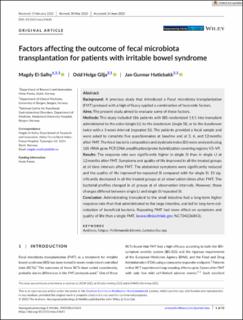| dc.contributor.author | El-Salhy, Magdhy | |
| dc.contributor.author | Gilja, Odd Helge | |
| dc.contributor.author | Hatlebakk, Jan Gunnar | |
| dc.date.accessioned | 2024-02-12T12:51:12Z | |
| dc.date.available | 2024-02-12T12:51:12Z | |
| dc.date.created | 2023-09-08T16:43:23Z | |
| dc.date.issued | 2023 | |
| dc.identifier.issn | 1350-1925 | |
| dc.identifier.uri | https://hdl.handle.net/11250/3117001 | |
| dc.description.abstract | Background
A previous study that introduced a Fecal microbiota transplantation (FMT) protocol with a high efficacy applied a combination of favorable factors.
Aims
The present study aimed to evaluate some of these factors.
Methods
This study included 186 patients with IBS randomized 1:1:1 into transplant administered to the colon (single LI), to the duodenum (single SI), or to the duodenum twice with a 1-week interval (repeated SI). The patients provided a fecal sample and were asked to complete five questionnaires at baseline and at 3, 6, and 12 months after FMT. The fecal bacteria composition and dysbiosis index (DI) were analyzed using 16S rRNA gene PCR DNA amplification/probe hybridization covering regions V3–V9.
Results
The response rate was significantly higher in single SI than in single LI at 12 months after FMT. Symptoms and quality of life improved in all the treated groups at all time intervals after FMT. The abdominal symptoms were significantly reduced and the quality of life improved for repeated SI compared with for single SI. DI significantly decreased in all the treated groups at all observation times after FMT. The bacterial profiles changed in all groups at all observation intervals. However, these changes differed between single LI and single SI/repeated SI.
Conclusion
Administrating transplant to the small intestine had a long-term higher response rate than that administrated to the large intestine, and led to long-term colonization of beneficial bacteria. Repeating FMT had more effect on symptoms and quality of life than a single FMT. (www.clinicaltrials.gov: NCT04236843). | en_US |
| dc.language.iso | eng | en_US |
| dc.publisher | Wiley | en_US |
| dc.rights | Navngivelse-Ikkekommersiell 4.0 Internasjonal | * |
| dc.rights.uri | http://creativecommons.org/licenses/by-nc/4.0/deed.no | * |
| dc.title | Factors affecting the outcome of fecal microbiota transplantation for patients with irritable bowel syndrome | en_US |
| dc.type | Journal article | en_US |
| dc.type | Peer reviewed | en_US |
| dc.description.version | publishedVersion | en_US |
| dc.rights.holder | Copyright 2023 The Author(s) | en_US |
| dc.source.articlenumber | e14641 | en_US |
| cristin.ispublished | true | |
| cristin.fulltext | original | |
| cristin.qualitycode | 2 | |
| dc.identifier.doi | 10.1111/nmo.14641 | |
| dc.identifier.cristin | 2173645 | |
| dc.source.journal | Neurogastroenterology and Motility | en_US |
| dc.identifier.citation | Neurogastroenterology and Motility. 2024, 36 (1), e14641. | en_US |
| dc.source.volume | 36 | en_US |
| dc.source.issue | 1 | en_US |

